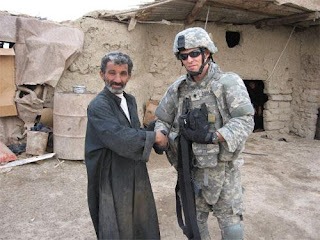America has been fighting a war against terrorism for almost nine years. Many individuals have compared this war to Vietnam, and they've been arguably successful in pointing out the similarities. However, there are also several differences between these two wars, the most obvious being that, with Vietnam, there was a noticeably larger split in regards to who supported the war, and who was against it. This could be due to the fact that, during Vietnam, the public was more informed due to the constant media coverage. That's not to say that we're completely in the dark in regards to the current war, but there is noticeably less coverage on this war than there was with Vietnam. During the Vietnam War, Americans had the opportunity to see things objectively, and thus draw their own conclusions. Thanks to reporters like Walter Kronkite, who actually went to Vietnam in an effort to report the facts objectively, Americans were able to gain a clearer perspective.
So, perhaps the media coverage (or lack thereof) is the most notable difference between the two wars. Obviously it would be pretty expensive, difficult, and risky for any of us to take a plane to Afghanistan and see what's up. Luckily, I was able to do the next thing best thing and talk to someone who had actually fought in this current war.
SGT. Clyde Jordan (27) is a man that has accomplished more than most of us will in a lifetime. He served as part of the 82nd Airborne Division in the Army for five and a half years, and twenty-seven months of that time were spent at war. SGT. Jordan had the unique opportunity of being able to experience this war first-hand, which is something that not many of us civilians can claim to have done. Bearing that in mind, his experience at war was anything but easy.
It goes without saying that it would be hard for a soldier to consider Iraq a "home away from home," only a select few people stationed in Iraq were given adequate housing. Most soldiers (and this includes SGT. Jordan) were subject to some pretty terrible living conditions. "Some people had great living conditions, but for me, they were horrible." explains Jordan, "Everyone over there serves a vital purpose, but I know some people who were cooks, not even cooks, really, just people who planned menus and oversaw the other chefs, and they got to live in trailers with electricity." We then see that several men like Jordan, who were actually fighting in the war, were forced to stay in tents with virtually no protection or electricity. "Bugs could easily crawl in at night," says Jordan. "It wouldn't be surprising to wake up to a Camel Spider eating some food that you left out the night before."
The hardships don't stop there, though. There were plenty of distressing factors that added a confusing element. "It was hard to determine who you were fighting against," explains Jordan, "people over there were walking around with AK-47's for their protection, but they may not have been an enemy. We knew this one guy over there named Hani, who was our information guy. He was hired by the Sheik of the area to overlook the incoming water supply." Even though Hani (pictured below, with SGT. Jordan) was technically considered to be on the "other side," he proved to be a valuable asset, and provided SGT. Jordan with some useful information relatin
 g to enemy activity.
g to enemy activity.The thing is, Hani wouldn't just give out information for free, he required a very specific form of compensation: Pepsi. "Hani would pretty much rat out his mother for a Pepsi," states Jordan, "he'd tell us all kinds of inside information, but he never asked for money, only Pepsi." Hani even went so far as to refuse any kind of meat as payment. "One day we gave him a Pepsi and some beef jerky," explains Jordan, "but he didn't eat the beef jerky. That's because it's a tradition over there to kill all animals you eat by slitting their throats while their heads are pointed toward Mecca."

Though there were some obviously negative events occurring, it would be crazy to say that it was all bad. While SGT. Jordan was in Iraq, he had done some incredible things, one of the most notable being that he saved the life of a drowning girl. "Her uncle wasn't able to pay me, so he painted a picture," explains Jordan. "It's not like I wanted money. It's my job, you know?"
Jordan has certainly had some time to reflect since being back, and that reflection is evident in his closing statements: "I believe that as long as we're there, we're gonna be fighting. The people over there are very religious and have a very negative view of western civilization. I mean, even if you're nice to them, they still hate you, unless of course you give them a Pepsi. I don't think being there any longer is going to help the situation at all. The best thing do to would be to leave."